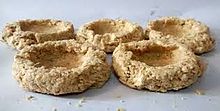Tilkut: Difference between revisions
No edit summary |
No edit summary Tags: Mobile edit Mobile web edit |
||
| Line 16: | Line 16: | ||
| other = |
| other = |
||
}} |
}} |
||
'''Tilkut''' is a sweet made in the Indian states of [[Bihar]] and [[Jharkhand]]. Tilkut is especially made and |
'''Tilkut''' is a sweet made in the Indian states of [[Bihar]] and [[Jharkhand]]. Tilkut is especially made and eaten during "Makar sankranti" festival. This is also known as "Tilkatri". It is made of pounded 'til' or [[sesame seeds]](Sesamum indicum) and jaggery or sugar. The best Tilkut is said to be from [[Gaya, India|Gaya]] and is native to [[Magadh]] region only. Reference to this dry sweet is found in the Buddhist literature as ''palala''. |
||
Normally, three types of tilkuts are available — the refined Sugar tilkut is |
Normally, three types of tilkuts are available — the refined Sugar tilkut is white in colour, the Shakkar tilkut is made of unrefined sugar and is light brown in colour and the Gur tilkut is made of jaggery and is dark brown in colour. Each of these varieties has its own flavour. The circular shaped savoury is called tilkut and the smaller nut-sized ones are called tillouri. |
||
Winter is the period when |
Winter is the period when sugarcane is harvested. It is also when large quantities of tilkut are made in many towns and even villages. However, as the demand persists throughout the year, smaller quantities are made round the year. |
||
Tilkut is generally associated with Makar Sankranti, the harvest festival and eaten during this time. |
Tilkut is generally associated with Makar Sankranti, the harvest festival and eaten during this time. |
||
Revision as of 20:33, 6 April 2020
 | |
| Alternative names | Tilkatri, palala |
|---|---|
| Course | Dessert |
| Place of origin | India |
| Region or state | East India |
| Created by | Bihar |
| Main ingredients | Tila, jaggery or sugar |
| Variations | Almonds |
Tilkut is a sweet made in the Indian states of Bihar and Jharkhand. Tilkut is especially made and eaten during "Makar sankranti" festival. This is also known as "Tilkatri". It is made of pounded 'til' or sesame seeds(Sesamum indicum) and jaggery or sugar. The best Tilkut is said to be from Gaya and is native to Magadh region only. Reference to this dry sweet is found in the Buddhist literature as palala.
Normally, three types of tilkuts are available — the refined Sugar tilkut is white in colour, the Shakkar tilkut is made of unrefined sugar and is light brown in colour and the Gur tilkut is made of jaggery and is dark brown in colour. Each of these varieties has its own flavour. The circular shaped savoury is called tilkut and the smaller nut-sized ones are called tillouri.
Winter is the period when sugarcane is harvested. It is also when large quantities of tilkut are made in many towns and even villages. However, as the demand persists throughout the year, smaller quantities are made round the year.
Tilkut is generally associated with Makar Sankranti, the harvest festival and eaten during this time.
Regions
Tilkut is Seasonal Dessert used in the Indian States of Bihar and Jharkhand,
During the time of December and January tilkut is sold widely in these regions and it is loved dessert for all ages.
See also
